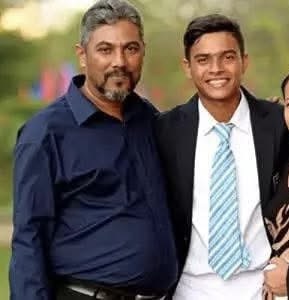A Retired Cricketer
The death of Suranga Wellalage on September 18, 2025, has sent shockwaves through Sri Lankan cricket that extend far beyond the boundaries of the sport itself. The 53-year-old former wicketkeeper-batsman, who captained Prince of Wales’ College Moratuwa in 1993, suffered a fatal cardiac arrest while watching his son Dunith endure one of cricket’s most brutal experiences – conceding 32 runs in the final over against Afghanistan.
What followed Dunith’s expensive bowling figures was a familiar yet disturbing pattern in modern cricket: social media erupted in a torrent of abuse directed at both the young spinner and captain Charith Asalanka’s decision-making. Within hours, a promising cricketer had become the target of thousands of angry voices, his every mistake dissected and amplified across digital platforms.
For Suranga Wellalage, watching from afar, the vitriol may have been unbearable. Here was his son – the boy he had coached and mentored from childhood – being torn apart by strangers who would never face the pressure of bowling to international batsmen with a match on the line.
The Social Media Scourge
The incident has reignited urgent questions about social media’s role in modern sport. Cricket, once a gentleman’s game played before appreciative crowds, has morphed into a gladiatorial spectacle where every ball is scrutinized and every failure becomes ammunition for online mobs.
Young cricketers today don’t just battle opposing teams; they face an invisible army of keyboard warriors ready to pounce on any sign of weakness. The psychological toll is immense, but it extends beyond the players themselves to their families, who watch helplessly as their loved ones are subjected to public humiliation.
The transformation has been swift and merciless. Social media platforms that promised to bring fans closer to their heroes have instead created echo chambers of negativity where nuanced understanding of cricket’s complexities is lost in the rush to assign blame.
Performance at All Costs
Suranga’s death also highlights cricket’s relentless demand for perfection. In an era where every statistic is recorded and every failure replayed endlessly, the pressure on players has reached unprecedented levels. The margin for error has all but disappeared, replaced by an expectation that professional cricketers should be immune to the failures that define the sport’s very nature.
This “performance at all costs” mentality has created a generation of cricketers who carry enormous psychological burdens. They know that one poor over, one dropped catch, one mistimed shot could trigger an avalanche of criticism that follows them for months or even years.
For families watching from the sidelines, this pressure is equally intense. Parents who once celebrated their children’s sporting achievements now fear the potential backlash of poor performances. The joy of cricket is being steadily eroded by the weight of expectation and the certainty of harsh judgment.
The Health Crisis Among Former Cricketers
Perhaps most concerning is the emerging pattern of cardiac-related deaths among former Sri Lankan cricketers. Suranga’s passing follows several similar incidents, suggesting a deeper health crisis that demands immediate attention.
Former athletes often struggle with the transition from highly active professional lives to more sedentary retirement. The cardiovascular systems that were once finely tuned for peak performance can suffer when regular intense exercise stops. Add to this the stress of watching children face public criticism, and the health implications become genuinely alarming.
Cricket boards and medical professionals must urgently address this trend. Regular health screenings for former players should be mandatory, not optional. The sport owes this duty of care to those who gave their best years to entertaining fans and building cricket’s legacy.
A Son’s Grief, A Nation’s Reflection
As young Dunith Wellalage flew from Abu Dhabi to pay his final respects to the man who was his first coach and biggest supporter, Sri Lanka began an uncomfortable period of self-reflection. The same public that had vilified him just days earlier suddenly rallied to his support, perhaps recognizing their role in a family’s tragedy.
This outpouring of belated sympathy, while welcome, cannot undo the damage already done. It serves instead as a stark reminder of social media’s power to destroy and the human cost of our collective hunger for sporting drama.
The Way Forward
Cricket in Sri Lanka and globally stands at a crucial juncture. The sport can continue down its current path, where players are treated as commodities and families bear the psychological cost of public expectations. Or it can reclaim its soul, remembering that behind every statistic is a human being deserving of respect and understanding.
Social media platforms must take greater responsibility for the content they host and promote. Cricket boards need to provide better mental health support for current and former players. Most importantly, fans must remember that their words have power and the power to inspire or destroy, to build up or tear down.
Suranga Wellalage’s death should serve as a wake-up call. In our pursuit of sporting excellence and entertainment, we must not lose sight of our humanity. The price of victory should never be measured in lives lost or families destroyed.
As Dunith returns to cricket, carrying both his father’s legacy and his nation’s hopes, perhaps we can learn to support our players with the same passion we once reserved for criticism. It may be the most important lesson cricket can teach us all.
The author extends condolences to the Wellalage family and calls for cricket communities worldwide to reflect on their role in supporting, not destroying, the athletes who represent their hopes and dreams.
